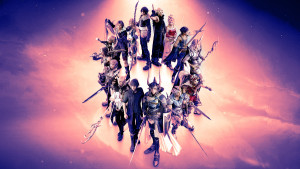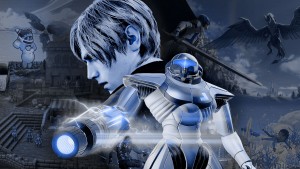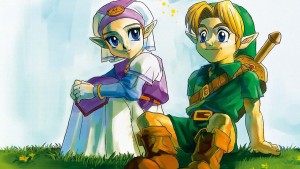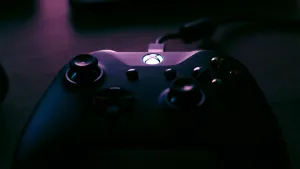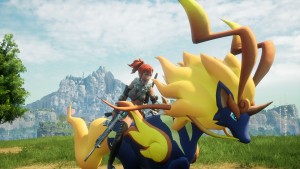Owlboy Review

Owlboy brims with an unbridled earnestness I can’t help but root for. Its characters are unflinching optimists, always looking for silver linings and the next course of action, even in the face of tragedy. The line between good and evil is crystal clear, being selfish or mean is looked down upon, and the story's tone tends to match that of a great children’s film. It also happens to be one of the most well-paced, clever, and fun games of the year.
Owlboy takes the freedom of movement of a side-scrolling shooter and blends it with the pacing and design sensibilities of a game like Zelda or Metroid, where you travel around a number of zones and solve puzzles. As Otus, an anthropomorphic owl, you’re free to fly in any direction for as long as you want. Moving around the world feels natural. On the ground, the game feels like a platformer; in the air, you maneuver around enemies and shoot them like you would in a dual-joystick shooter.
Instead of holding his own weapons, Otus enlists one of three friends who each fire a different type of gun. Geddy uses a pistol that lets you pick off enemies at a distance. Alphonse, who you meet later, uses a powerful musket that takes a long time to reload and has a short range. In hectic fights, I frequently start with Alphonse as my opening salvo, then switch to Geddy while keeping an eye on the reload timer, which gives every fight a fluid, cyclical pace. I won’t spoil the third friend, but they grant you even more mobility at the cost of firepower.

Making every gun its own character works brilliantly, since it reinforces Owlboy’s strong characters. Geddy, Alphonse, and Otus establish a good group dynamic through snappy dialogue that gives everyone a distinct personality. I came to like almost everyone in the supporting cast, who are all brought to life with incredibly detailed animations. Though Otus is silent, he says what he needs to with his facial and body language. When he’s surprised, his eyes bulge in a cartoonish fashion, and when he approaches a cemetery, he demures, treading slowly in respect.
A few sections limit your ability to fly, but most levels embrace your power of flight, and working through them feels refreshing as a result. During my first couple of hours, I had to remember that if I couldn’t find the missing piece or trick to solve a puzzle, I could just fly up to platforms that seemed out of reach. Whenever I got stuck later on, it was because I hadn’t thought of a particular use for a tool I already had, like the ability to hide from enemies behind boxes or grappling objects from afar (a skill you acquire later on). Some of the puzzles go by too quickly, but most are involved enough to make you scratch your head.
Every boss is a highlight, forcing you to maneuver deftly or use every tool at your disposal in clever ways. In many of them, the dynamic of avoiding projectiles while waiting for a tell mixes well with the Metroid-esque tendency to use the newest weapon at your disposal. Not all of the fights work this way; one boss, a giant worm, adheres more closely to the “avoid bullets and shoot the weakpoint” school of boss design, but it’s still a fun fight.
In the 10 hours it took me to get through Owlboy, I never felt like I was going through the motions, and I only once felt like I’d rather skip a part of the game, during a later stealth section aboard a pirate ship where the checkpoints were too spread out. But otherwise, I was constantly facing new situations. A few stealth sections slow the pace down, but they’re (mostly) not too frustrating. A few bombastic set-piece moments, like skimming from rock to rock to avoid a pirate ship’s cannon, punctuate these segments as well.
I constantly wanted to see what Owlboy would show me next, but I lingered on a few side activities, too. Rings and coins are scattered all throughout the world, and collecting them lets you upgrade your weapons and wear silly hats once you cross once you've collected enough coins. You can also seek out a couple of more well-hidden secrets. Seeking out coins is worthwhile, since the weapon upgrades are more powerful, and one side quest offers a bit more backstory.
While the characters and world of Owlboy made me want to keep going, the plot falls a bit short. Early on, the game sets up an interesting dynamic between Otus and his stern mentor, Asio, who scolds Otus frequently. The plot hints at why he’s so harsh with you, but the full reveal never comes. The relationship is thrown by the wayside for most of the game, and the unsatisfying ending doesn’t tie up the loose thread. Instead, it introduces a convoluted plot point in the last hour, then never fully explains that, either.
Owlboy not only has the hook of a new idea to mix up the genres it mettles in, but the fundamentals to follow up on it. Its sense of movement is fluid, its momentum is strong, and its characters are engrossing. The tone might be saccharine at times, but when so many other games go for either oppressive grittiness or eye-rolling irreverence, I’m willing to accept that.
















